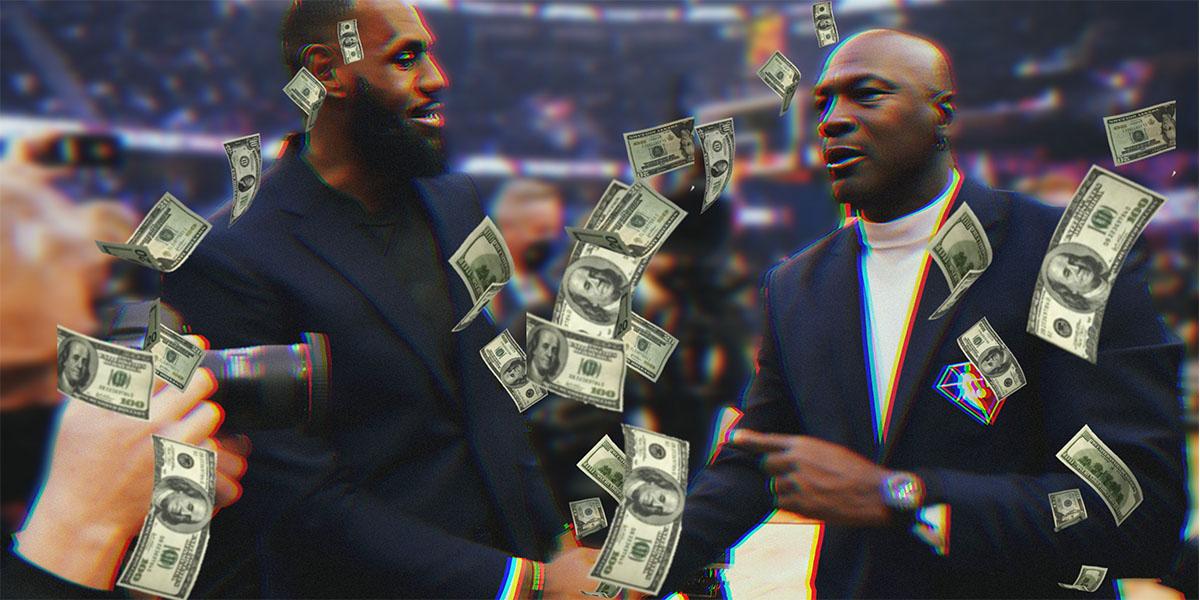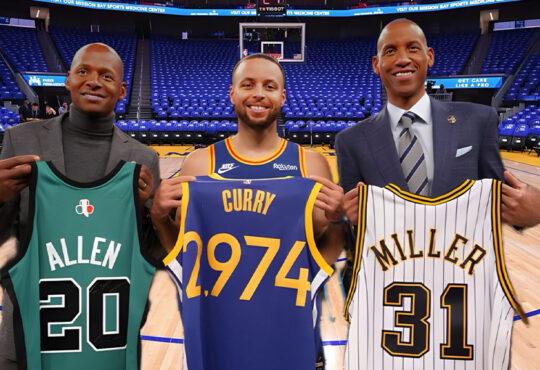
NBA Players and Their Pensions: A Comprehensive Look into Retirement Benefits and Financial Planning
When do NBA players get their pensions? There are many financial benefits that come with being an NBA player. But what happens after they retire? When do players get their pensions, and what kind of financial security do they have once their playing days are over? Let’s take a look at the retirement benefits available to former NBA players.
When we think of professional athletes, we often imagine the fame, fortune, and luxurious lifestyles that come with being at the top of their game. NBA players, in particular, enjoy some of the highest salaries in the world of professional sports. But what happens when their playing days are over? How do these athletes plan for their future, especially when their careers can be relatively short compared to other professions?
After years of dedication and hard work, NBA players can bask in the reward of their labor through a pension. Available to those who have retired by 45 years old or older, this fund presents more than just monetary repayments for life – depending on various criteria such as tenure within teams and age at opt-in; retirees may be eligible for additional benefits provided by the league itself. Of course, if one wishes to achieve maximum remuneration later down the road it is recommended they don’t rush into jumping onto any offers until 62!
In this blog post, we’ll explore the NBA pension system, which provides financial security for retired players. We’ll discuss when players can start receiving their pensions, how much they can expect to receive, and the factors that determine these amounts.
The NBA Pension Plan
The NBA pension system is designed to provide a stable source of income for retired players who have dedicated years of their lives to the sport. The pension plan is funded by both the league and the players, with contributions made throughout a player’s career. The pension benefits are separate from the players’ salaries and are intended to help them maintain a comfortable lifestyle after retirement.
The National Basketball Association Retirement Plan provides pension benefits to former players. The plan works like a 401K, with players contributing 4 percent of their salaries into an individual retirement account that earns interest and accrues value over time. At the end of their career, players can start receiving payments from their pension starting at age 45. It is important to note that the amount of money a player receives in retirement depends on how long they played in the league and how much money they made while playing.
The amount a player receives in pension benefits depends on two main factors: their age when they start collecting the pension and their years of experience in the league. Generally, the longer a player has been in the NBA, the higher their pension benefits will be.
Collective Bargaining Agreement (CBA) Benefits
In addition to the pension plan, there are other retirement benefits for former NBA players outlined in the collective bargaining agreement between the league and its players. This includes disability protection for season-ending injuries, life insurance for active and retired players, as well as access to health care plans for retired players who were employed by the league during any part of 15 consecutive seasons. All these benefits provide valuable financial support for ex-players when they no longer earn a salary from basketball.
In addition to the pension plan, the Collective Bargaining Agreement (CBA) between the NBA and its players includes various retirement benefits for former players. These benefits aim to provide financial support and security for ex-players when they no longer earn a salary from basketball.
One such benefit is disability protection for season-ending injuries, which ensures that players receive financial assistance if they suffer career-ending injuries during their time in the league. This protection is crucial for players whose careers are cut short due to severe injuries.
Life insurance is another key benefit provided by the CBA for both active and retired players. This coverage ensures that the families and loved ones of players are financially protected in the event of a player’s death.
Furthermore, the CBA grants access to healthcare plans for retired players who were employed by the league during any part of 15 consecutive seasons. This benefit is particularly significant, as it helps retired players maintain their health and well-being after their basketball careers have ended.
Overall, the retirement benefits outlined in the NBA’s Collective Bargaining Agreement play a vital role in supporting former players as they transition to life after basketball. These benefits help ensure that players who have dedicated their lives to the sport can maintain their financial stability and well-being in retirement.
Post-Retirement Opportunities
In addition to these standard retirement benefits, there are also post-retirement opportunities available for former NBA stars. These include broadcasting roles, coaching jobs, management positions with teams, or corporate sponsorships with sports apparel companies and other organizations related to basketball. Some high-profile former players such as Magic Johnson and Michael Jordan have gone on to become successful entrepreneurs after their playing days ended; Johnson opened movie theaters across urban cities while Jordan established his own brand of sneakers—both earning millions in revenue each year from those ventures.
Financial Planning for NBA Players: Beyond Basketball
For NBA players, planning for their future beyond basketball is crucial in ensuring long-term financial stability and success. While the NBA pension system offers a safety net for retired players, it’s essential for athletes to take a proactive approach to their financial planning. This includes making smart financial decisions, investing wisely, and exploring post-retirement career opportunities. In this section, we’ll discuss various aspects of financial planning that NBA players should consider during and after their careers.
Building a Solid Financial Foundation
During their playing careers, NBA players should focus on building a solid financial foundation by:
- Creating a personalized budget and adhering to it
- Establishing an emergency fund
- Reducing and managing debt
- Saving for retirement through retirement accounts, such as 401(k)s and IRAs
- Regularly reviewing and adjusting their financial plan as needed
By taking these steps, players can ensure they are living within their means, saving for the future, and reducing financial stress.
Investing Wisely
As mentioned earlier, diversifying investments across various asset classes, such as stocks, bonds, real estate, and private equity, is a crucial strategy for NBA players to achieve long-term financial stability and minimize risk. By working with financial advisors and maintaining a well-balanced portfolio, players can protect their wealth and capitalize on growth opportunities in different sectors of the market.
Exploring Post-Retirement Career Opportunities
While the average NBA career lasts around 4.5 years, players need to plan for a future that extends well beyond their time on the court. This involves exploring post-retirement career opportunities and developing skills that can be utilized in other industries. Some potential career paths for retired NBA players include:
- Coaching or sports management
- Broadcasting or sports journalism
- Entrepreneurship or business ownership
- Public speaking or motivational speaking
- Philanthropy or community work
- Acting or entertainment
By identifying their interests and passions early on, players can start building connections and gaining experience in their chosen fields, making the transition to a post-basketball career smoother and more successful.
Continuing Education
Pursuing higher education or professional certifications can be a valuable investment for NBA players, as it can open doors to new career opportunities and increase their earning potential after retirement. Many universities and institutions offer flexible programs and online courses tailored to the needs of professional athletes, allowing players to continue their education while still playing in the NBA.
Estate Planning and Wealth Transfer
As NBA players accumulate wealth, estate planning becomes an essential aspect of their financial planning. By working with estate planning attorneys and financial advisors, players can develop strategies to protect their assets, minimize estate taxes, and ensure their wealth is transferred to their loved ones according to their wishes.
In conclusion, financial planning for NBA players goes beyond basketball and involves making smart financial decisions, investing wisely, and preparing for a successful post-retirement career. By focusing on building a solid financial foundation, exploring career opportunities, and engaging in lifelong learning, players can secure their financial future and enjoy a fulfilling life after their time on the court.
Building a Financial Team for NBA Players
For NBA players, building a team of financial experts is a crucial step in securing their financial future and managing their wealth effectively. These professionals can help athletes create a comprehensive financial plan, manage their investments, and navigate complex tax and legal issues. In this section, we’ll discuss the roles of various financial experts and how they can support NBA players in achieving their financial goals.
Financial Advisor
A financial advisor is a professional who provides guidance on various aspects of personal finance, including budgeting, saving, investing, and retirement planning. They can help NBA players develop a personalized financial plan based on their income, expenses, financial goals, and risk tolerance. Financial advisors can also recommend suitable investment strategies and products to help players grow their wealth and achieve their financial objectives.
When selecting a financial advisor, players should look for professionals with relevant certifications, such as Certified Financial Planner (CFP) or Chartered Financial Analyst (CFA), and a strong track record of success in working with professional athletes.
Accountant
An accountant is a financial professional who specializes in managing and analyzing financial records, preparing tax returns, and ensuring compliance with tax laws and regulations. For NBA players, working with an accountant is essential in navigating the complex tax landscape associated with their high earnings, multiple income sources, and frequent changes in residency due to team transfers.
A Certified Public Accountant (CPA) with experience in handling the unique tax needs of professional athletes can help NBA players minimize their tax liabilities, maximize deductions, and avoid costly tax penalties.
Attorney
An attorney, particularly one specializing in sports or entertainment law, can provide valuable legal advice and representation for NBA players. They can help players negotiate and review contracts, protect their intellectual property rights, and manage any legal disputes that may arise during their careers.
In addition to a sports or entertainment attorney, players may also need to consult with other legal specialists, such as estate planning attorneys or family law attorneys, depending on their individual circumstances.
Insurance Agent
An insurance agent can help NBA players evaluate their insurance needs and select appropriate coverage to protect their assets and income. This may include life insurance, disability insurance, and property insurance for their homes and vehicles. By working with an experienced insurance agent, players can ensure they have adequate protection against unforeseen events that could impact their financial well-being.
Coordinating the Financial Team
Once a financial team is assembled, it’s essential for NBA players to maintain regular communication and coordination among team members. This ensures that all professionals are working together toward the player’s financial goals and that their strategies are aligned.
In summary, building a team of financial experts, including financial advisors, accountants, attorneys, and insurance agents, is a critical step for NBA players in managing their wealth and securing their financial future. By working closely with these professionals, players can develop a comprehensive financial plan, optimize their investments, and navigate the complex tax and legal landscape associated with their careers.
Diversifying Investments for NBA Players
Diversifying investments is a key strategy for NBA players to ensure long-term financial stability and minimize the risk associated with market fluctuations. By spreading their wealth across a range of asset classes, players can reduce the impact of poor-performing investments and capitalize on the growth potential of various sectors. In this section, we’ll explore different investment options and discuss how NBA players can create a diversified investment portfolio.
Stocks
Investing in stocks allows NBA players to own a share of a company and potentially benefit from its growth. Stocks can be an attractive investment option due to their potential for high returns. Players can diversify their stock investments by owning shares in companies across various industries, sizes, and geographical locations. Additionally, they can invest in exchange-traded funds (ETFs) or mutual funds, which pool together a diverse range of stocks and provide instant diversification.
Bonds
Bonds are fixed-income investments that involve lending money to governments or corporations in exchange for interest payments and the return of principal at the end of the bond’s term. Bonds typically offer lower returns than stocks but tend to be less volatile, providing a more stable source of income. NBA players can diversify their bond investments by owning a mix of government and corporate bonds with varying maturities and credit ratings.
Real Estate
Real estate investments can offer NBA players a way to generate passive income and build long-term wealth. Players can invest in residential or commercial properties, either directly or through real estate investment trusts (REITs). REITs are companies that own and manage income-producing real estate, allowing investors to buy shares and receive dividends from the rental income. By investing in different types of properties and geographical locations, players can diversify their real estate holdings and reduce risk.
Private Equity
Private equity investments involve investing in privately held companies or buying out public companies and taking them private. These investments can offer high returns but typically come with higher risk and less liquidity than publicly traded stocks and bonds. NBA players can gain exposure to private equity through direct investments, co-investments, or by investing in private equity funds managed by professional investment firms.
Alternative Investments
In addition to traditional asset classes, NBA players can also consider alternative investments, such as commodities (e.g., gold, oil), hedge funds, or venture capital. These investments can provide further diversification and help protect against inflation or economic downturns. However, they may also involve higher risk and fees, so players should consult with their financial advisors to determine if alternative investments are suitable for their portfolios.
Creating a Diversified Investment Portfolio
To create a diversified investment portfolio, NBA players should work closely with their financial advisors to assess their risk tolerance, investment goals, and time horizon. Based on these factors, their advisors can recommend an appropriate asset allocation strategy that balances risk and reward. By regularly reviewing and rebalancing their portfolio, players can ensure that their investments remain diversified and aligned with their financial objectives.
In conclusion, diversifying investments across various asset classes, such as stocks, bonds, real estate, and private equity, is a crucial strategy for NBA players to achieve long-term financial stability and minimize risk. By working with financial advisors and maintaining a well-balanced portfolio, players can protect their wealth and capitalize on growth opportunities in different sectors of the market.
Budgeting and Saving for NBA Players
For NBA players, developing a budget and adhering to it is essential in managing their spending and securing their financial future. With the potential for high earnings during their playing careers, it’s crucial for players to establish healthy financial habits and make wise decisions with their money. Here, we’ll delve deeper into budgeting and saving strategies specifically tailored for NBA players.
Creating a Personalized Budget
The first step in budgeting is for NBA players to create a personalized budget that accounts for their unique financial situation. This involves tracking their income, expenses, and financial goals. A well-structured budget should include categories such as:
- Housing (mortgage or rent payments, property taxes, utilities)
- Transportation (car payments, insurance, fuel, maintenance)
- Food (groceries, dining out)
- Entertainment (movies, concerts, vacations)
- Savings and investments
- Debt repayment (student loans, credit card debt)
- Charitable giving
- Taxes
By allocating a specific percentage of their income to each category, players can ensure they are living within their means and avoiding unnecessary financial stress.
Establishing an Emergency Fund
An essential component of a solid financial plan is setting aside a portion of income for an emergency fund. This fund acts as a financial cushion in case of unexpected expenses, such as medical bills, home repairs, or a sudden loss of income. For NBA players, it’s recommended to have at least six months’ worth of living expenses saved in an easily accessible, low-risk account, such as a high-yield savings account or a money market fund.
Saving for Retirement
While the NBA pension system provides a safety net for retired players, it’s crucial for athletes to actively save for their retirement. This can be achieved by contributing to retirement accounts, such as a 401(k) or an individual retirement account (IRA). Players should work with their financial advisors to determine the most suitable retirement savings strategy based on their financial goals and risk tolerance.
Automating Savings
One effective method to ensure consistent saving is by automating the process. NBA players can set up automatic transfers from their checking accounts to their savings or investment accounts. This “pay yourself first” approach helps players prioritize saving and removes the temptation to overspend.
Monitoring and Adjusting the Budget
Finally, NBA players should regularly review their budgets and make adjustments as needed. This might involve cutting back on discretionary spending, reallocating funds to meet financial goals, or adjusting the budget to accommodate changes in income or expenses. By staying on top of their budget, players can maintain control over their finances and continue to build wealth throughout their careers and beyond.
In summary, budgeting and saving are essential components of a solid financial plan for NBA players. By creating a personalized budget, establishing an emergency fund, saving for retirement, automating savings, and consistently monitoring their financial situation, players can ensure long-term financial stability and success.
Exploring Post-Retirement Career Opportunities
Many former NBA players transition into coaching, broadcasting, or other roles within the sports industry, while others pursue entrepreneurial ventures or philanthropic endeavors. By planning for their post-retirement career, players can ensure a smooth transition and maintain a steady income after their time on the court comes to an end.
The National Basketball Association offers valuable financial security for its retired athletes through its pension plan and collective bargaining agreement (CBA) benefits programs. In addition to those programs, former players can also benefit from post-retirement opportunities such as broadcasting roles and corporate sponsorships which can further secure their future after leaving professional basketball behind. With all these options available to them, ex-NBA stars will be able to rest easy knowing that their playing careers have provided them with financial stability far beyond what most professional athletes receive upon retiring from sports.
While the NBA pension system provides a safety net for retired players, it’s crucial for athletes to plan for their future beyond basketball. This includes making smart financial decisions, investing wisely, and exploring post-retirement career opportunities. Many former NBA players transition into coaching, broadcasting, or other roles within the sports industry, while others pursue entrepreneurial ventures or philanthropic endeavors.
In conclusion, the NBA pension system plays a vital role in ensuring the financial security of retired players. By understanding when they can start receiving their pensions and how much they can expect to receive, players can make informed decisions about their future and enjoy a comfortable retirement after their time on the court comes to an end.
Sources:





